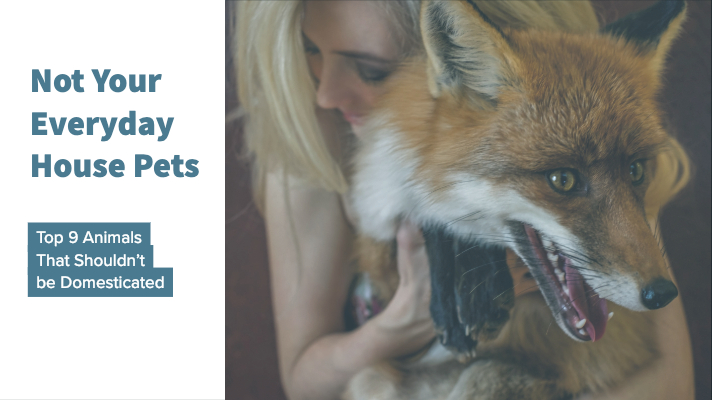Attempting to keep wild animals as pets is never a good idea. Safe neither for aspirant owners nor the animals themselves, some endanger human lives while others simply fail to thrive outside the wild.
Lemurs, capuchins, chimpanzees, and baboons all fall into the primate category. They are cute and “childlike” but are not a substitute for human babies. Sure, they are often treated like babies by their owners putting them in diapers and strollers but they also act like babies, permanently, with all the messes and screaming included.
The biggest issue with pet monkeys is that they are prone to rampages without warning and, possessing sometimes shocking levels of strength while lacking what we comprehend as 'moral conscience' or reason, chances of effectively controlling such behaviors are slim. They may also bite their owners which is something the health department doesn't like. This is especially scary given the fact that they can transmit diseases like Hepatitis A and HIV-1, the virus that causes AIDS.
Cougars, lions, tigers, and leopards make up the majority of large cats kept as pets. They are strong and dangerous, to say the least. If you think you can just de-claw a lion like you did your little house cat then think again. De-clawing removes the entire last bone in each toe. If you remove the tips of the toes of a large cat, they are unable to properly walk because of their size and become paralyzed when the procedure is done incorrectly.
Large cats like tigers kill their prey by biting their throats, not by clawing them to death, so they are still dangerous even without claws. If the teeth don’t kill you, their crushing jaw pressure will. Removing dangerous body parts does not create a good pet.
Venomous snakes could kill you with a single bite and there is most likely no anti-venom close enough to help you. Some cobras can also cause immense pain and blindness just by spitting their venom into your eyes. There are plenty of pet snakes available that do not produce venom so it is easy to stick with the safer species.
Extreme safety measures must be taken if these snakes are kept in a home, and if they do escape, you are endangering the lives of not only your family but your neighbors, too.
Despite the fact that bears can weigh over 1500 pounds full grown, people still feel they are like cute and cuddly teddy bears. Bear cubs are appealing for many reasons but they don’t stay small for long. They will tower over you when they stand on their hind legs and can knock you over, or even kill you, with a swift blow of their paw.
The coati (pronounced ko-wot-ee and sometimes referred to as a coatimundi) is a member of the raccoon family. Originally from South America, these omnivores require a large enclosure to roam about. They are extremely active and difficult to train. They have 38 to 40 sharp teeth, forage for their food, and require a lot of mental stimulation, much like a pet monkey.
Needless to say, even though they are kept as pets more and more, they are still wild animals that can deliver a pretty nasty bite.
What carries Rabies and SARS, has sharp teeth, sleeps all day, and flies all night? Bats. The truth is, bats are extremely cute and intriguing, but a hands-off approach is best since there is the possibility of zoonotic disease and no realistic way to care for a bat in your home.
They can live over 30 years, hibernate for months in colder climates, and eat insects, fruit or blood at night (depending on the species). These little guys are better left outside so don't bring one of these cute critters into your home intentionally.
Wolf and coyote ancestors were too wild to live alongside humans which is why domesticated dogs exist. Wolves and coyotes are still wild today and they act on their instincts. They hunt when they are hungry, play when they want to, and sleep the rest of the day. If they feel threatened, they will attack.
They can kill a full-grown moose and sense the sickest animal in a herd, even when that animal shows no symptoms. Like large cats and bears, they are far from domesticated and cannot be trusted. Wolfdogs have also grown in popularity as pets but are not much different from their pure wolf cousins, therefore, they too should be avoided.
The American alligator can reach over 14 feet in length and kill prey as large as cattle. Most homes cannot accommodate such a large predator. These animals can cause serious infections from bites, causing limb amputations, knock you down with a whip of their tail while it breaks your legs, and even kill you with their bite force of around 2000 pounds. You don't want to see a male gator during mating season. These animals should be respected but not kept as pets.
With the exception of the tiny Fennec fox (or the domesticated Silver/Siberian Fox), foxes are not recommended as pets. Red foxes can become very tame, but never fully trustworthy and are especially dangerous around children, just like other wild canines such as wolves. They are far from being domesticated and they also have a musky odor that is far worse than a ferret.
They have teeth like any other canine and if scared they may resort to their wild instincts and cause you or someone else harm. Also, most states will destroy a pet fox if a bite is reported because there is no vaccination protocol, despite being similar in size and relation to a dog.










